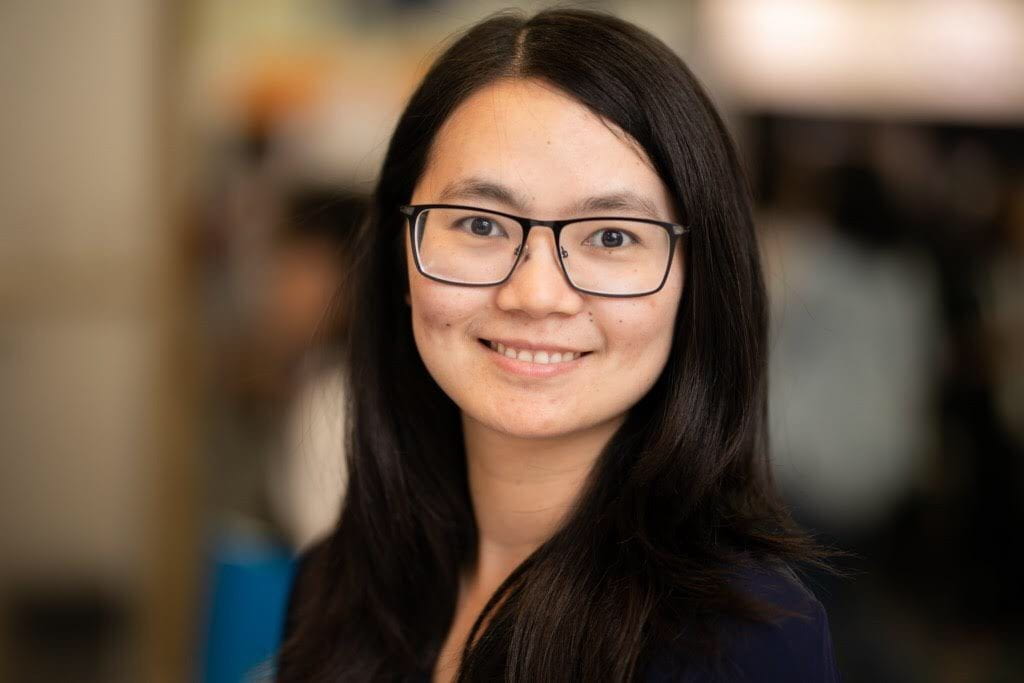 Liuliu Zheng was wrapping up her Ph.D. in Biochemistry and Molecular Biology at Baylor College of Medicine when she sought help to build tools to interpret her research data.
Liuliu Zheng was wrapping up her Ph.D. in Biochemistry and Molecular Biology at Baylor College of Medicine when she sought help to build tools to interpret her research data.
The Rice University Computer Science alumna (M.C.S. ’16) said, “I had collected a huge amount of data, more than I could manually quantify or analyze. The computer scientists in my group helped me build software to quantify my data, and I began to see the power of programming for massive data set analysis. Could I create my own software tools?
“My interest in learning to program prompted me to take some classes in Coursera and my first one was Scott Rixner’s Programming with Python. I really loved it and felt I had the passion required to go further with my programming. Rice was just across the street, and I entered the professional master’s program as soon as I finished my Ph.D.”
Her new beginning thrust her into several challenges at once. Zheng’s first CS course at Rice, object-oriented programming with Stephen Wong, was taught in Java. Zheng had never written in Java, so she was learning the language, adapting to object-oriented programming, and collaborating with classmates to meet their assigned workgroup projects every two weeks.
“Every week, we worked in different pairings, which forced me to meet more people. Everyone I talked to, including Dr. Wong, gave me the feeling they really loved doing this.”
Zheng noticed she was the oldest student in her classes, and the other students focused on technology careers while she just wanted a way to boost her research potential. But by her second semester, the course material and problems were growing more interesting and she began feeling re-inspired by the passion of her younger peers.
“All of my Rice experiences – instructors, classmates, the program director – were super helpful for me,” she said. “Eugene Ng, the program director, even agreed to be my mentor so I could meet a work authorization requirement for an internship.
“In addition to mentoring me through my internship, Dr. Ng talked with me about his own research and I took one of his courses. We discussed how people develop careers in tech and he offered advice for how a student like me – without a long CS history or deep background – should structure my courses and my schedule. I needed to arrange time not only for picking up new knowledge from my courses but also to get up to the programming speed of other students.”
Ng recalled those discussions with Zheng, as well as her determination. He said, “Liuliu’s experience is a great example of the power of the MCS program. Liuliu was already an accomplished scholar in biochemical sciences when she entered Rice, but with the MCS program, she stretched her scholarly potentials much further. She worked very hard to gain the computational skills she was yearning for, and her results were fantastic!”
She credits everyone in the program – from Wong and Ng to her helpful classmates – for planting and watering the seed that grew into her passion for solving problems with software. Slowly, her career focus began to shift. Her summer internship led to additional work in the fall, and then Microsoft came calling.
“I found I really loved programming and had a passion for it,” said Zheng. “Schlumberger offered me an internship, and then Microsoft offered me a full-time role, and that gave me confidence in myself as a software engineer. That is when I began thinking it might be my future career.”
Her advice for current and prospective CS students is to get comfortable talking to strangers and to take advantage of Rice’s rich resources, both within the department and across campus.
“When the Career Expo came up in the fall, I had only been in the program one month. At the time, I was shocked by the number of companies who wanted to talk to CS students – even those with only a month of classes – about careers and internships. It forced me to acknowledge the huge difference between opportunities in research and the tech industry. And I had to talk to people.
“As a student researcher, I primarily interacted with my mentor, labmates and the colleagues from the department. Instead of proactively having conversations, I spent more time on focusing on my own projects. That first Rice Career Expo made me realize if you can’t talk to people, you will lose out on most of the opportunities out there no matter you are a researcher or a professional in industry.”
Zheng pushed past her shyness and learned to speak up, to explain why her skills were strong, and to show employers how competitive a candidate she was for their openings. She used the people and workshops at Rice’s Center for Career Development to shape up her resume and get advice on how to approach recruiters.
Two and a half years after graduating from Rice, Zheng has definitely found her voice. She said, “I recently joined Airbnb, and a good day is when I get to talk to people in my team about the overall picture and design of our project. I also love spending time on my coding, but getting the chance to talk to people on the business side –with the engineering and marketing people all together, and having input on the business direction – I can see my progress. That makes me happy.
“Plus, there are always activities at Airbnb. At least once a day, there is an event where I can take a break and get to know more people.”